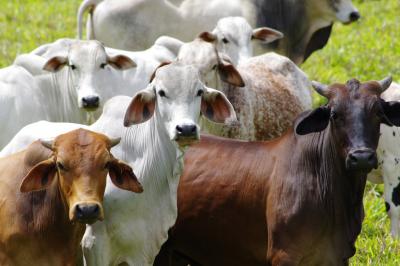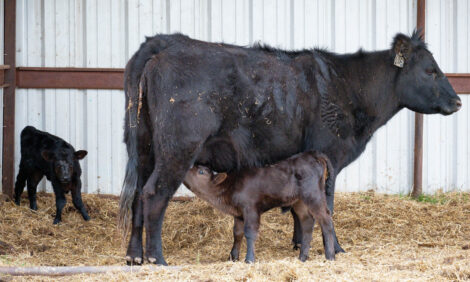



GRSB: Regional Indicators Will Drive Sustainable Beef Progress
ANALYSIS – The Global Roundtable for Sustainable Beef (GRSB) recently met in Amsterdam with 75 members from across the food chain representing 28 organisations with the key objective of working groups reporting back and sharing progress to-date.
Larry Stewart, senior director, global supply chain for beef, pork and fish with McDonald’s and a member of the GRSB executive committee, attended the meeting and shared his perspective of where the GRSB is headed.
“The regional roundtables have really pulled together and are working to shape indicators that stem from the GRSB Principles and Criteria which were approved last November at the GRSB’s meeting in São Paulo, Brazil,” Mr Stewart said. “The indicators are about making sustainable beef production practices relevant for regional production systems and ecosystems.”
Mr Stewart said the regional roundtables have done a lot of hard work to develop the right indicators for their area.
“It’s exciting to see this work come to life in Canada, in the US, in Brazil, and some of the other affiliated organisations like the SAI Platform in Europe to see producers, processors and retailers all pulling together to make beef more sustainable,” he said.
Mr Stewart said not all of the working groups have an easy road and some have a “difficult or thorny” time of it – the topic of antibiotics being one area that will require a lot of discussion to find a middle ground among the food chain and NGOs.
The GRSB working groups are also discussing how they can assist the regional roundtables to understand and embrace the accepted Principles and Criteria.
“The GRSB is not about forcing anything on anybody; it’s about setting the framework for regional roundtables to make the right decisions for their constituencies,” he said. “It’s hard work, and while it’s never one hundred percent right or perfect, the objective is to share what you know and to be fully transparent with the stakeholders about the knowledge gained.”
The GRSB also recognised the launch of the Canadian Roundtable and the US Roundtable. Brazil was the first to develop a roundtable named the Brazilian Roundtable on Sustainable Livestock (GTPS).
Most Important Issues for GRSB to Address?
 First, the GRSB plans to communicate to the regional roundtables a clear and full understanding and appreciation of the Principles and Criteria as the foundation of how the GRSB will move forward to guide the global industry toward a more sustainable beef chain.
First, the GRSB plans to communicate to the regional roundtables a clear and full understanding and appreciation of the Principles and Criteria as the foundation of how the GRSB will move forward to guide the global industry toward a more sustainable beef chain.
The next step is for the regional roundtables to identify the indicators they're going to use to measure success as a baseline. Through the indicators that are being established for each area, the GRSB will be able to identify and demonstrate what progress is being made.
“We’d like to see the beef value chain become more sustainable every year and be able to prove it by measuring the indicators as outcome measures,” he said.
“Then we’d like to communicate and apply these practices to improve sustainability regionally where it makes sense. We know there isn’t one silver bullet to develop sustainable beef. GRSB is working toward identifying and promoting continual improvement.”
Each of the regional roundtables presented where they are with their plan development and the development of their indicators, including critical aspects of their production system that require the establishment of a baseline for future measurement.
GRSB Long Term Objectives
 Over the long term, it’s all about making progress and communicating.
Over the long term, it’s all about making progress and communicating.
“For example, in Brazil beef is raised very differently than it is in the US, so it’s reasonable to expect that they're going to be looking at and working on different things than the US and other countries,” Mr Stewart said.
“It may be about pasture land management in Brazil, but it’ll be important to share commonalities across the globe. There might be some indicators that are shared in regions and some that are completely different.”
Making sure GRSB is sharing best practices is critical and creating indicators is the foundation.
“Most importantly, what’s the success? How are we making cattle production more sustainable in Brazil? How are we doing it more sustainably in Canada or in Europe? And making sure that everyone understands that while the production systems may be different, the goal’s the same,” he said.
“Truly, nobody has to figure everything out themselves – we are all working together for the same long-term goal.”
What Does Success Look Like?
As for success, Mr Stewart said they will be continuously redefined as progress occurs. However for now, the regional indicators that are going to be measured - whether they are pasture management, water quality, rations, or whatever is defined - are key to improvement.
“At the end of the day, that’s why GRSB is doing this – we want to be objective, we want to be measurable and we want to communicate out to the regional roundtables so we can grow the success,” he said.
“Let’s not forget that we also want economic sustainability as well for all steps in the chain.”
By moving the baseline to a more efficient system, there’s economic value to be gained.
Looking through the McDonald’s lens of the three E’s – economics, environment and ethics – ethics will be considered under the Principles and Criteria’s social justice working group.
“We’re trying to be inclusive in the Principles and Criteria as they weren’t developed just for the McDonald’s three E’s. Right or not, social justice is one of those thorny ones, but there are groups working on it and the GRSB is lending all of the help that we can so that there's a lot of resources from a problem solving capacity looking at these issues. They aren’t all easy by any means.”
Communication is going to be a success factor as well. The GRSB has no plans to keep anything secret. On the contrary, Mr Stewart said they want to openly share what works and what doesn’t work with the agriculture industry.
“There's no guarantee that the first time we tackle some of these really thorny issues that we’re going to have success,” he said.
“But the important thing is that we’re open and transparent and willing to say, look, we tried it this way, and it didn’t work. Now let’s try it again.”

.JPG)


